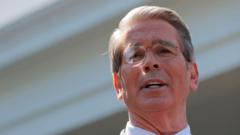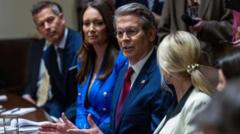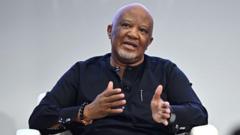Treasury Secretary Scott Bessent's decision to miss the G20 finance ministers meeting underscores diplomatic frustrations with South Africa following controversial land reform policies, marking a significant departure from traditional U.S. engagement.
U.S.-South Africa Relations Strained as Treasury Secretary Bessent Skips G20 Meeting

U.S.-South Africa Relations Strained as Treasury Secretary Bessent Skips G20 Meeting
The decision to boycott key international meetings reflects growing tensions between the Trump administration and South Africa over land policy disputes.
Treasury Secretary Scott Bessent will not attend the upcoming G20 finance ministers and central bankers meeting in Cape Town, South Africa, a decision that signifies deepening tensions between the United States and South Africa due to controversial land reforms. This is particularly noteworthy as Bessent was only confirmed to his role three weeks ago and his absence at such a high-profile economic gathering is highly unusual for a Treasury Secretary.
Bessent's boycott follows a similar action by Secretary of State Marco Rubio, who opted out of a foreign ministers meeting earlier this week in Johannesburg. Rubio criticized the meeting’s focus and stated his intention not to “waste taxpayer money or coddle anti-Americanism." Under President Trump, the U.S. government has expressed skepticism towards multilateral engagements like the G20, favoring instead bilateral negotiations with countries.
The upcoming G20 meetings will focus on themes of “Solidarity, Equality, Sustainability,” which contrast sharply with the Trump administration's perspectives on climate change and diversity. Bessent was expected to seize the opportunity to engage with financial leaders from key global players, including Europe, China, and Russia, marking a significant platform for international dialogue.
The backdrop of these tensions includes ongoing diplomatic strains stemming from the war in Ukraine and the U.S.’s remarks about Russia. Trump has hinted at a desire to reshape relations with Russia, even asserting that Ukraine's actions might have led to the conflict.
Moreover, the United States’ relationship with South Africa is complicated by Trump’s recent directives, which include a halt on foreign aid and a pledge to prioritize the resettlement of white “Afrikaner refugees” from South Africa, signifying a controversial stance against the South African government’s land policies. These policies, encapsulated in the Expropriation Act, seek to redistribute land without compensation, reprising discussions on historic injustices rooted in apartheid.
The indications of diplomatic discord come as a surprise to South African officials, who had expected Bessent’s participation. An official from South Africa's Department of International Relations and Cooperation had previously announced that he would attend, signifying a missed opportunity for collaboration amid rising geopolitical complexities.




















